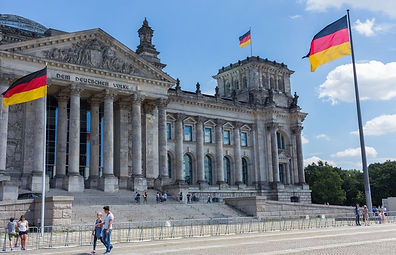.png)
Abroad Studies
+91 87478 75999
+91 79751 37442
Working Hours:
Monday to Saturday : 10am – 6PM
Your Aspiration, Our Inspiration
Study in Germany
Seminar on Germany Universities Admission Process
-
Types of Universities
-
Admission System of Germany Universities
-
Importance of Shortlisting
-
Conversation with ECTS (European Credit Transfer System)
States and Cities In Germany
-
Capital of Germany – Berlin
-
Total States – 16 States
-
No of Towns and Cities – 300 Largest Cities and Towns
-
Population – 37 Million People
-
Official Language – German
-
Time Zone – (UTC-2.00)
Top 15 universities and world ranking (QS Ranking)
States and Cities In Germany
-
101 million people speak German worldwide
-
Most widely-spoken language of the European Union
-
The number of German pages on the internet takes second place after English-speaking pages
-
Ranked 3rd worldwide for the number of books published
-
More than 250,000 international students in Germany
-
The largest economy in Europe & the 3rd largest in the world
-
High academic standards & standard of living
-
1) Technische – University Munchen – Ranked 64th
-
2) Ludwig – Maximilians – University Munchen – Ranked 66th
-
3) Ruprecht – Karls – University Heidelberg – Ranked 68th
-
4) KIT, Karlsruher Institute of Technology – Ranked 107th
-
5) Humboldt – University of Berlin – Ranked 120th
-
6) Freie University Berlin –Ranked Joint 125th
-
7) Rheinisch – Westfalische Technische Hochschule Aachen – Ranked 141th
-
8) Technische University Berlin – Ranked 144th
-
9) Eberhard Karls University Tubingen – Ranked 164th
-
10) University Freiburg – Ranked 178th
-
11) Georg August University Gottingen – Ranked 181st
-
12) University Hamburg – Ranked 223rd
-
13) Rheinische Friedrich Wilhelms University Bonn – Ranked 239th
-
14) University Frankfurt am Main – Ranked joint 254th
-
15) University Stuttgart – Ranked joint 259th
Admission Requirements (UG)
Years 1 & 2
-
Need relevant subjects (Science – PCM, Business, Commerce, and Accountancy) with 85% or B Grade or 3.0 GPA for any proposed Bachelor's degree.
Proof of relevant language proficiency
-
Need to meet language proficiency by providing IELTS (Min 6.0 no less than 5.5 bands in any module), Tofel (89 ibt), PTE (63)
-
The German language required a minimum B1, for some top universities required C1
Admission Requirements (PG)
Bachelor's degree from a recognized University
-
Need relevant bachelor's degree with First Class or Distinction or B Grade or 3.0 GPA for any proposed master's degree.
Proof of relevant language proficiency
-
Need to meet language proficiency by providing IELTS (Min 6.5 no less than 6.0 band in any module), Tofel (89 ibt), PTE (63)
Specific requirements by the Individual University
-
University may expect GRE/GMAT scores for certain programs
-
Experience might need for some courses
-
Some Universities expect A1 and A2 certificates for the German Language
Working in Germany
-
Studying is a full-time occupation, but students may find a part-time job on or off-campus in order to gain practical experience and improve their financial situation. Up to 120 full days or, 240 half days per year are allowed!
-
After graduating from a German university, you may stay on for another 1.5 years to search for qualified employment.
-
Those successful in their search can have their residence permit extended (work permit).


Visa Details
-
Apply, at least three months before your arrival
-
Visa Type – Resident Permit (more than 90 days of course)
-
Duration of Visa – 2 years
-
Visa Fee – Euro 60
-
Processing time – 25 days
-
Apply through – Direct Consulate
-
Stay back period – 18 months
